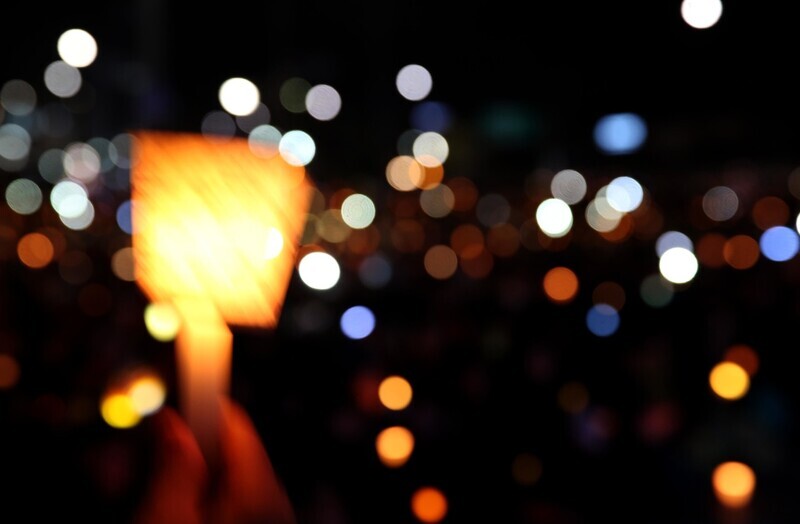hankyoreh
Links to other country sites 다른 나라 사이트 링크
[Column] This is not why we held up candles in Gwanghwamun Square

Six years ago, Kim Yeong-oh, after losing his daughter Yu-min in the tragic sinking of the Sewol ferry, went on a 46-day hunger strike. Joining Kim in a 10-day solidarity fast was Moon Jae-in, then a lawmaker with the Democratic Party.
But now that Moon is president, Kim Seong-muk, one of the survivors of the ferry accident, has been fasting in front of the Blue House for more than a month. His demands are mostly the same as those made by Kim Yeong-oh six years ago: he wants the accident to be fully investigated and the guilty parties prosecuted.
The Special Investigation Committee on Social Affairs, which has been handling the investigation into the Sewol accident, will wrap up its activities on Dec. 10; five months after that, the statute of limitations will take effect for crimes related to the Sewol incident.
But the facts of the case remain murky. Whenever the family members of the Sewol victims ask for the truth, the government tells them to wait for the outcome of investigations by the Special Investigation Committee and by the prosecutors. But they’ve waited and waited, and now they’re running out of time.
On Nov. 2, a petition asking the National Assembly to disclose records related to former President Park Geun-hye and to extend the activities of the Special Investigation Committee was signed by more than 100,000 people. But the ruling party has yet to make a response.
Four years ago, there was a filibuster in the National Assembly to stop the passage of an anti-terrorism bill. The opposition party lawmakers who took part in the filibuster — which lasted for a total of 192 hours and 27 minutes, setting a world record — promised to repeal the Act on Counter-Terrorism if they became the ruling party.
The Democratic Party incorporated that promise into its campaign pledge in the general election. But even after opposition parties gained a majority of seats in the 20th National Assembly in 2016, none of them tabled a bill to repeal the Act on Counter-Terrorism.
In the 21st National Assembly, Lee Byeong-hun, a lawmaker with the ruling Democratic Party, submitted a revision to the act. The revision would expand the definition of terrorism to include the refusal to be tested or treated for an infectious disease. In short, a bill that would considerably expand the scope of the Act on Counter-Terrorism was submitted by the very party that organized a filibuster against that act, claiming it would allow public surveillance without a warrant and infringe on constitutional rights.
Two years-ago, 24-year-old Kim Yong-gyun, who was working for a subcontractor at the Taean Power Plant, was crushed to death in a conveyor belt. President Moon Jae-in met the man’s mother, Kim Mi-suk, and promised to “build a system that would prioritize life and safety over profit,” while Democratic Party leader Lee Hae-chan said he would “work to pass legislation to impose tougher penalties and prevent the recurrence of such accidents.”
Politicians didn’t keep promise to stop “outsourcing of risk”While a revision of the Occupational Safety and Health Act nicknamed the “Kim Yong-gyun Act” eventually passed the National Assembly, politicians didn’t keep their promise to stop the “outsourcing of risk.” The act placed extreme limitations on the industries in which prime contractors can be held responsible for such accidents. The “Kim Yong-gyun Act” doesn’t even cover Kim’s own workplace or Guui Station on the Seoul subway, where another worker surnamed Kim died while doing repairs.
This past August, a petition was submitted to the National Assembly asking for the enactment of a bill that would allow the prosecution of companies responsible for serious accidents. The petition was proposed by none other than Kim Mi-suk, now with the Kim Yong-gyun Foundation.
The bill was even mentioned by Lee Nak-yon, newly elected leader of the Democratic Party, in a speech before the National Assembly on Sept. 7. “Each year, around 2,000 workers die on the job. That’s a tragedy we have to stop. The standing committee responsible for the bill should take steps to enable its swift enactment,” Lee said.
But more recently, the Democratic Party has been looking into the option of revising the Occupational Safety and Health Act instead of enacting the new bill, out of concern for the potential burden on companies. The revised act, submitted by Democratic Party lawmaker Jang Cheol-min, would greatly increase the fines on corporations instead of prosecuting responsible figures at prime contractors. The bill would impose fines as high as 10 billion won (US$9.04 million) for companies at which three or more workers die over the course of a year.
This past September, a truck driver was killed after getting caught in machinery at the same power plant where Kim Yong-gyun died. Two people died in two years, but that would slip through the net cast by the Democratic Party’s proposed revision. There’s no telling where the party came up with the idea of a fine of 10 billion won for three deaths in a year. Even a fine of 100 billion won (US$90.45 million) for five deaths in a year wouldn’t change the fact that the prime contractor-subcontractor system leads to an average of 5.5 people a day dying in industrial accidents.
Hope can eventually turn into rageHope, no matter how slender, can give us the strength to endure misfortune and adversity. Even when people are broke and homeless, and lacking any decent treatment, the mere hope that things will improve if they hang on a little longer can unlock superhuman perseverance and dedication.
But even hope has an expiration date. When our hopes are disappointed and disregarded time and time again, hope turns into frustration, sadness, and eventually rage.
I remember how I felt during the candlelit rallies about four years ago. The chill of the asphalt rose up my spine, but I didn’t even care how cold it was. I was suffused with the hope that this was a chance to cut the rot out of politics once and for all.
This isn’t the world we envisioned when we carried the candles. A party was brought to power through the hope of those candles, but that party was supposed to use that power to achieve each and every one of the wishes represented by those candles.
The ruling party ought to remember what happens to politicians who grow arrogant and complacent, taking for granted their rock-solid support base. Setting up an office to investigate corruption among senior officials and reforming the public prosecution are meaningless if it’s unclear who stands to gain from those reforms. Remaining in power may be the outcome of reform, but should never be its goal.

By Lee Jin-sun, founder of research and coordinating network Wagl
Please direct comments or questions to [english@hani.co.kr]

Editorial・opinion
![[Editorial] Penalties for airing allegations against Korea’s first lady endanger free press [Editorial] Penalties for airing allegations against Korea’s first lady endanger free press](https://flexible.img.hani.co.kr/flexible/normal/500/300/imgdb/original/2024/0502/1817146398095106.jpg) [Editorial] Penalties for airing allegations against Korea’s first lady endanger free press
[Editorial] Penalties for airing allegations against Korea’s first lady endanger free press![[Editorial] Yoon must halt procurement of SM-3 interceptor missiles [Editorial] Yoon must halt procurement of SM-3 interceptor missiles](https://flexible.img.hani.co.kr/flexible/normal/500/300/imgdb/child/2024/0501/17145495551605_1717145495195344.jpg) [Editorial] Yoon must halt procurement of SM-3 interceptor missiles
[Editorial] Yoon must halt procurement of SM-3 interceptor missiles- [Guest essay] Maybe Korea’s rapid population decline is an opportunity, not a crisis
- [Column] Can Yoon steer diplomacy with Russia, China back on track?
- [Column] Season 2 of special prosecutor probe may be coming to Korea soon
- [Column] Park Geun-hye déjà vu in Yoon Suk-yeol
- [Editorial] New weight of N. Korea’s nuclear threats makes dialogue all the more urgent
- [Guest essay] The real reason Korea’s new right wants to dub Rhee a founding father
- [Column] ‘Choson’: Is it time we start referring to N. Korea in its own terms?
- [Editorial] Japan’s rewriting of history with Korea has gone too far
Most viewed articles
- 160% of young Koreans see no need to have kids after marriage
- 2Months and months of overdue wages are pushing migrant workers in Korea into debt
- 3Presidential office warns of veto in response to opposition passing special counsel probe act
- 4[Editorial] Penalties for airing allegations against Korea’s first lady endanger free press
- 5Historic court ruling recognizes Korean state culpability for massacre in Vietnam
- 6Hybe-Ador dispute shines light on pervasive issues behind K-pop’s tidy facade
- 7Japan says it’s not pressuring Naver to sell Line, but Korean insiders say otherwise
- 8[Guest essay] How Korea must answer for its crimes in Vietnam
- 9Story of massacre victim’s court victory could open minds of Vietnamese to Korea, says documentarian
- 10Historic verdict on Korean culpability for Vietnam War massacres now available in English, Vietnames